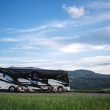Full-time RVers ask themselves tons of questions before they travel during blistering cold winters or blazing heat summers like: Is my RV designed for this type of weather? Are there significant issues that could arise? How do I protect my RV from these harsh conditions? What is the best way to go about protecting myself from expensive repairs? All these questions are legitimate and are questions that all seasoned and beginner RVs need to think about. Now the easy answer to these questions is to avoid harsh conditions all together, as the repairs and maintenance can get pretty expensive. With winter right around the corner, we will be sharing tips from some of the RV experts on the RVUSA forum!
What to expect before you purchase:
First and foremost, preparation for winter can be traced back to the initial RV purchase. Some RV makes and models are prepared to be the “4 Season RV” and include the basic RV tools and items to keep your RV from taking too much damage during the winter months. Other RVs offer an “arctic” package and if you plan to travel during freezing weather, we recommend including the package as the RV will need those upgrades before it’s prepared for that type of weather.
Here is what you should look for: heated tanks, dual pane windows, additional floor insulation, heated basement compartments, etc. If you are not sure if these features come standard or not, look on our forum about which RVs are the best for winter and then ask your sales person about these features and make sure you understand the strength and weaknesses of each RV.
What to expect after the purchase:
So you have an RV or bought a new RV and you are traveling to an extremely cold area, what now? While the arctic package is a great start to protecting your RV, it’s not the all in one solution. Before traveling, make sure to find and read the section in your owner’s manual about specific winterizing guidelines and then read some tips and tricks from experienced RVers regarding what items you should bring on the journey on a “just-in-case basis.”
In addition, do some research about the area you will be visiting, you may be surprised how many RV parks close during winter and running an RV off propane alone could leave it a sitting duck after a few hours.






